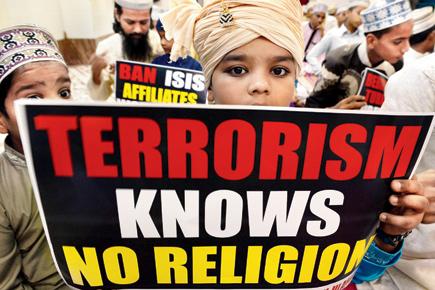Actually, nobody quite knows the answer to that question. And presumptions have led to riots, misplaced priorities and disaffection of millions

Muslims held rallies in many parts of world and spoke out against extremism braving personal risk. Young students in Mumbai also gathered to denounce ISIS on November 20.
 Actually, nobody quite knows the answer to that question. And presumptions have led to riots, misplaced priorities and disaffection of millions. That’s because Muslims in Kerala do not necessarily want to hear the same thing as Muslims of Kashmir. But by and large, Muslims in every part of the country want the same things as Hindus, Christians, Sikhs, Jains, Buddhists or atheists want: right to life and liberty, a dignified existence.
Actually, nobody quite knows the answer to that question. And presumptions have led to riots, misplaced priorities and disaffection of millions. That’s because Muslims in Kerala do not necessarily want to hear the same thing as Muslims of Kashmir. But by and large, Muslims in every part of the country want the same things as Hindus, Christians, Sikhs, Jains, Buddhists or atheists want: right to life and liberty, a dignified existence.
ADVERTISEMENT
The past few weeks have seen more discussions world wide than ever before about: what Muslims want, what Muslims need, what Muslims ought to do, what should be done with Muslims, what should be done to Muslims, why Muslims do what they do and so on. It is indeed weird that people would think that what Muslims in London think and do is what Muslims of Istanbul would think and do.

Muslims held rallies in many parts of world and spoke out against extremism braving personal risk. Young students in Mumbai also gathered to denounce ISIS on November 20. Pic/AFP
Many urban Indians who are part of WhatsApp groups, and the Facebook and Twitter-savvy would have received several updates these past weeks, of ‘wisdom-filled’ insights on why Muslims do what they do. These are forwarded and reposted with utmost glee without so much as a fact check on the claims. It results in disinformation multiplying with rapidity that is dangerous and spreads disaffection towards entire populations.
But don’t get massively upset with that bigoted relative or narrow-minded friend of yours. Even in a rich and diverse country like the US, or in tolerant and so far considered egalitarian Europe, the chatter among the intelligentsia and the general public is just about this. What is it that Muslims want to hear that will make them more settled, calmer, accepting, help them assimilate, make them more like everybody else? These are complex issues that have different answers in each town and village, let aside countries and continents.
But what is certainly happening is a deep-seated fear among Muslims that anti-Islam sentiment has never been as high as it is right now. Not even after the 9/11 attacks. In India too, many Muslims and liberals feel that there is a great degree of unease, which is reminiscent of the time of the Ayodhya movement. Inflammatory rhetoric and moronic fatwas and diktats by religious and political leaders also create an atmosphere of fear bordering on hysteria.
The media or the commentariat does not amplify the voices of moderation and sanity among Muslims. You will find Azam Khan being sought after by the chatterati more than a Maulana Madani. The same is true in the conference circuit. A discredited warmonger like General Musharraf was paid thousands of dollars in the international conference circuit than the voices of reason and moderation that risk their lives in Pakistan by speaking out against extremism.
In Europe and America, there is a visible lack of political will to put a lid on anti-Muslim sentiment. Administrations want to crack down on terror networks without the hindrance of human rights activists breathing down their necks. Unlike just after 9/11, you no longer hear voices of reason saying that terror is not the voice of Islam and that terrorists are not following any religious path. There is a pattern that is emerging after the Paris attacks — from heads of government to opinion leaders, the message to Muslims appears to be: we really are no longer going to say things that you may want to hear. We are going to say things that you need to hear so that you may comprehend and change your ways.
The danger is that these messages are just what the ISIS wants Muslims to hear so that across the world Muslims feel helpless and marginalised and see the ISIS as an alternative to their sense of isolation.
Muslims held rallies in many parts of world and spoke out against extremism braving personal risk. #NotInMyName was a hashtag that became immensely popular. In India too, several Muslims spoke out against religious intolerance but got drowned out in the high decibel levels of the intolerant lot.
As we observe the seventh anniversary of the Mumbai terror attacks this week, it is time to reflect on the need to keep the country’s borders safe, its populations at peace with each other, for governments to ensure life and liberty of its citizens are not threatened. Disaffection among any community or group of people can tear the fabric of the country. Voices must be heard, grievances must be addressed. That is what Indian Muslims or Hindus or atheists would, I suppose, want to hear.
Smita Prakash is Editor, News at Asian News International. You can follow her on Twitter @smitaprakash
 Subscribe today by clicking the link and stay updated with the latest news!" Click here!
Subscribe today by clicking the link and stay updated with the latest news!" Click here!






